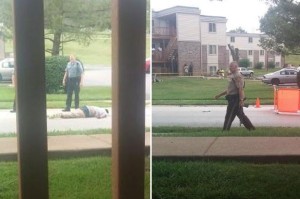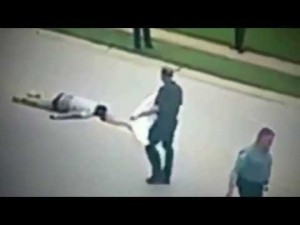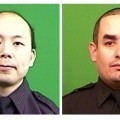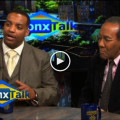Yesterday morning, as I was on the subway going to Manhattan, there were two young men of color sitting next to me. Both were around the same age as Michael Brown. I wondered if they would still be alive if they lived in Ferguson. I wondered about their thoughts as they walk the streets of New York and see a police officer or so called “neighborhood security” people such as George Zimmerman.
Do they consider these concerns everyday? Possibly so, since the murder of Michael Brown, Trayvon Martin and others may be on their minds. They have certainly seen police and others look at them differently from how they look at those who are not African- Americans.
As a white man, I can never totally relate to the thoughts, frustrations and fears of African Americans, Latinos, and others living in a society which is permeated with racism and bigotry and hate. I cannot walk in their shoes. I can only attempt to feel their fears and frustrations. I wonder if the two young men who sat next to me look at the police as enemies rather than as being there to protect them. Do they look at Michael Brown in the way they look at themselves, and fear that they too can wind up dead on a street at the hands of a police officer?
 The death of Michael Brown should have gone to a jury trial. A grand jury was not sufficient in this case. The police officer should have been questioned by an impartial prosecutor. All evidence should have been subject to close scrutiny. I highly doubt that the prosecuting attorney wanted an indictment. Please keep in mind that a prosecutor can, and often do, bring a defendant to a jury trial even if the grand jury does not indict.
The death of Michael Brown should have gone to a jury trial. A grand jury was not sufficient in this case. The police officer should have been questioned by an impartial prosecutor. All evidence should have been subject to close scrutiny. I highly doubt that the prosecuting attorney wanted an indictment. Please keep in mind that a prosecutor can, and often do, bring a defendant to a jury trial even if the grand jury does not indict.
A special prosecutor was needed, based on Robert McCulloch’s record. District Attorney Robert McCulloch has a record of not telling the truth to grand juries. In 1997, in the so-called “Kinkogate” case, McCulloch gave – using the power of the grand jury, but without informing it – a subpoena to the police in order to identify a whistleblower who was acting lawfully. He pretended his fax contained a threat. McCulloch later admitted that there was no threat and no crime, but denied any wrongdoing. The whistleblower had to quit his job.
In 2000, in the so-called “Jack in the Box” case, two undercover officers, a police officer and a Drug Enforcement Administration (DEA) officer, shot and killed two unarmed black men in the parking lot of a Jack in the Box fast-food restaurant in Berkeley, Missouri. In 2001, the officers told a grand jury convened by McCulloch that the suspects tried to escape arrest and then drove toward them; the jury declined to indict. McCulloch told the public that every witness had testified to confirm this version, but St. Louis Post-Dispatch journalist Michael Sorkin reviewed the previously secret grand jury tapes, released to him by McCulloch, and found that McCulloch lied: only three of 13 officers testified that the car was moving forward. A subsequent federal investigation found that the men were unarmed and that their car had not moved forward when the officers fired 21 shots; nevertheless, federal investigators decided that the shooting was justified because the officers feared for their safety. McCulloch also drew controversy when he said of the victims: “These guys were bums.” The two men killed, Earl Murray and Ronald Beasley, had prior felony convictions on drug and assault charges. Keep in mind that McCulloch’s personal history makes him more favorable to the police than the victim. His father, an officer, was tragically killed while on duty when McCulloch was twelve. He could not become a police officer, his career choice, because of one of his legs was amputated. He decided to become a prosecuting attorney. As reported by the St. Louis Post-Dispatch, his reason for becoming a prosecuting attorney: “I couldn’t become a policeman, so being county prosecutor is the next best thing”. I feel that McCulloch was not before the Grand Jury as an impartial prosecutor, but representing Darren Wilson. We do not know what evidence was provided, or if he lied to this grand jury as he lied to earlier grand juries. The entire episode smells. There was no justice.
 As I stated in previous columns, it is my feeling that a sizable percentage of our nation’s police officers harbor racist, sexist, homophobic, or otherwise prejudicial feelings. These feelings can be overt or subliminal. By subliminal, I mean that a person raised in a house where there is racism, such as the casual use of racial and other prejudicial epithets by family members with no recourse , will most likely carry those feelings subliminally, or even overtly, and act differently to those who are of a different racial, religious, gender or national background. Those deep seated notions might not be easily recognized by others, or even by themselves.
As I stated in previous columns, it is my feeling that a sizable percentage of our nation’s police officers harbor racist, sexist, homophobic, or otherwise prejudicial feelings. These feelings can be overt or subliminal. By subliminal, I mean that a person raised in a house where there is racism, such as the casual use of racial and other prejudicial epithets by family members with no recourse , will most likely carry those feelings subliminally, or even overtly, and act differently to those who are of a different racial, religious, gender or national background. Those deep seated notions might not be easily recognized by others, or even by themselves.
We must find a way to integrate the recognition of these thoughts in the training of our police forces. We must re-address the training of our police, nationwide. When anybody is given the power over life and death there has to be deep psychological testing before that person is given a gun. The Blue Wall of protecting other police officers must be shattered.
I can understand the stress of police officers on the street. They have families, long range plans and do not want to be injured or killed in the course of fulfilling their responsibilities to the public. As police officers, who have sworn to protect the public, they have a higher responsibility than any other public servant. It is essential that they know the people of the area they are policing. Personally, I feel that it would be best if the police lived in the community they are policing. The return of street beats, also known as foot patrols, is needed in every community. The police do not get to know the residents of a community by sitting in a squad car. In police terminology, a beat is the territory and time that a police officer patrols. Beat policing is based on traditional policing and utilizes the close relationship with the community members within the assigned Beat to strengthen police effectiveness and encourage cooperative efforts to make a safer community. Beat police typically patrol on foot or bicycle which provides more interaction between police and community members. This technique is needed. The training of probationary police officers is obviously not sufficient. The recent death of a young man in a stairwell was due to improper training. A life was lost.
Violence and revenge only begets more violence. We need to address the issues. If those issues were addressed and the basic racism was addressed we would not see the wanton killing going on. There has to be an acceptance and understanding of the frustrations our minority youth and elders have. I do not condone violence. But, I can understand it when frustrations, fears and a desire to effectuate change boils over as it has in Ferguson and in many other areas of our land. We’re all looking for our elected leadership to take charge on this issue. They need to step up.
As we try to come to terms with these issues that pollute our society and nation I pose the following question from my good friend Sharon Paige:
“So what do we do when we are told over and over again that the lives of young black men are worth less than the lives of others? When women are worth less than others? When the courts say it’s not worth further scrutiny? When people are blamed for their anger, for their own victimization? When every channel through which we can fight is corrupted and bigoted. What do we do?
Sincerely, what do we do?”
All opinions expressed by Editorialists & Columnists on this website and on our videos are solely their own opinions and do not necessarily reflect the opinions of The Bronx Chronicle, its management, or staff. You should not treat any opinion expressed as a specific inducement to make a particular investment or follow a particular strategy, but only as an expression of opinion.
Do you Agree? Disagree? Voice your opinions in the comments! You may also submit a rebuttal piece to opinions@thebronxchronicle.com. All editorial submissions are subject to possible proofreading/editing for grammar, structure, and respectability. Posting is not guaranteed.

















Follow Us